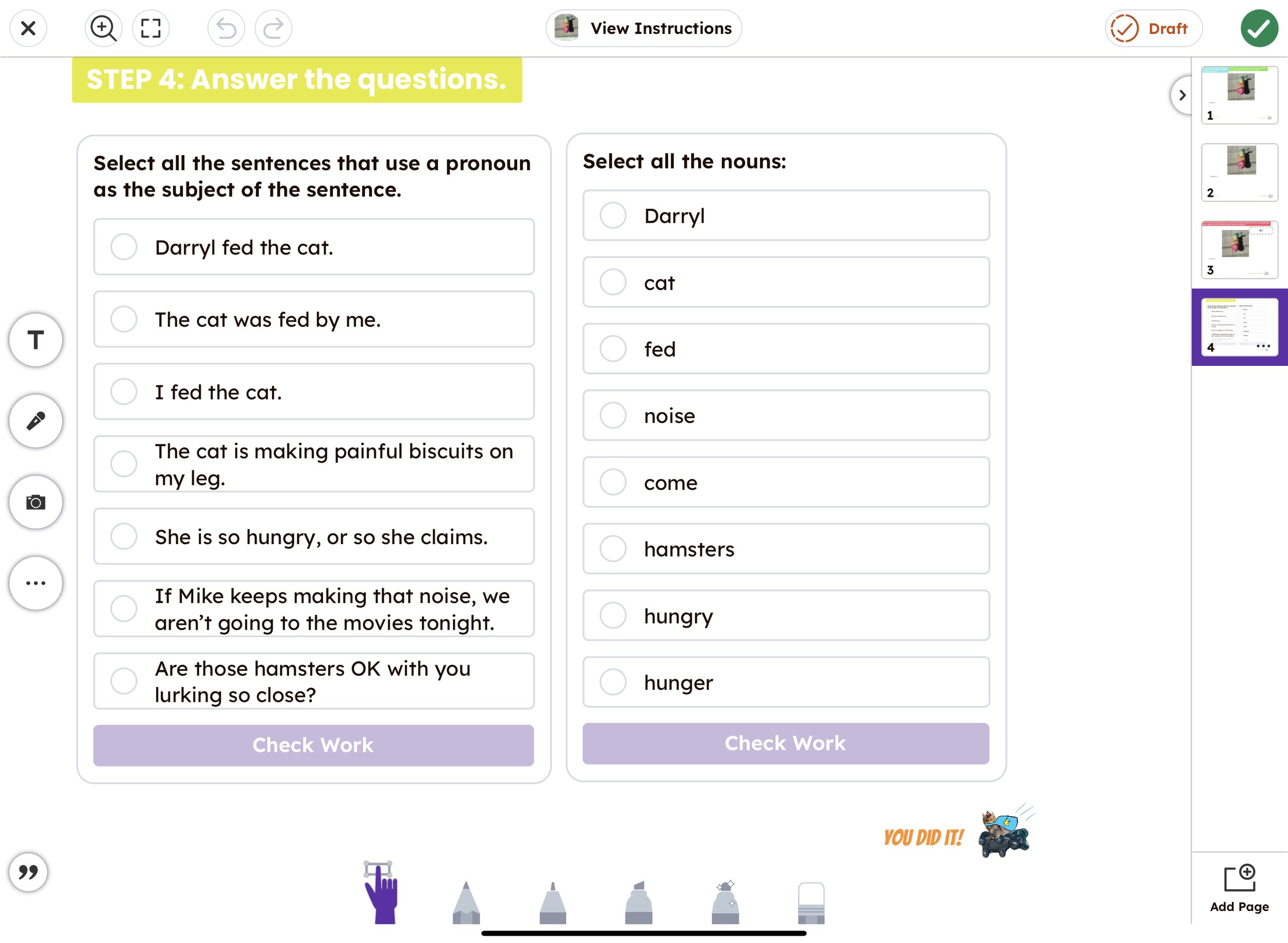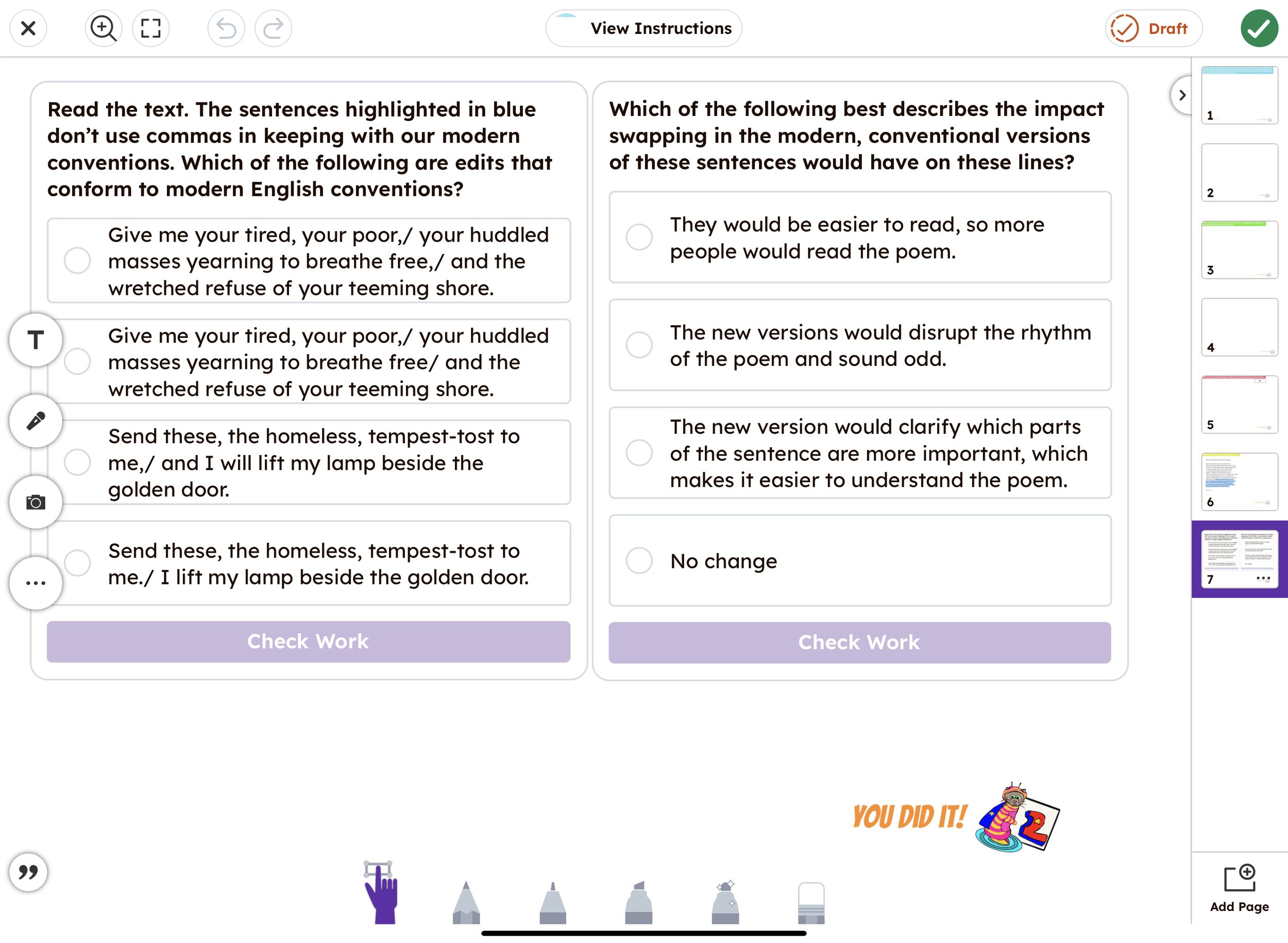New Features: Instant skill checks and much more!
June Writers is constantly refining and adding new features that maximize your child’s learning. To that end, we’ve begun rolling out three new features:
Instant skill checks
More critical reading practice
School assignment & application help and resources
Read on for more details!
New Feature #1: Skill checks
You may have noticed more multiple-choice and other types of standardized questions in your child’s practices. Yup, we’ve begun adding instant skill checks to many of our practices. These instant multiple-choice questions are a way for your child to double-check their understanding of all the grammar and mechanical concepts we teach. Though the open-writing components of our practices reveal your child’s comfort with a particular skill or concept, instant skill checks add another layer of analysis and let us cover edge cases of conventions. The questions are designed to allow your child to try as many times as needed to find the right answer. This allows us to see if your child has struggled with the question. If so, we’ll work with them to strengthen their grasp of the skill.
In addition, we’ve added skill checks to the beginning of Level 2: Arguments in Microcosm and Level 3: Texts Under Scrutiny to check whether new Level 2 and 3 students have gaps in their knowledge of foundational grammatical and mechanical concepts (e.g., the grammatical components of a sentence, etc.). We’ll use this information to tailor their progression through our curriculum.
Level 1: Complex Sentences and Level 2: Arguments in Microcosm now feature skill checks at the end of every relevant practice. Expect to see more skill checks in Level 3: Texts Under Scrutiny and above in the coming month.
Instant Skill Checks
Level 1: Complex Sentences and Level 2: Arguments in Microcosm students should expect to answer one to three instant skill check questions at the end of every practice, where relevant. June Writers is in the process of rolling out similar instant skill checks in Level 3 and above in the coming months.
New Feature #2: More critical reading!
High-quality writing goes hand in hand with strong critical reading skills because both depend on deep thinking. Though Level 3: Texts Under Scrutiny teaches advanced reading skills that allow kids to understand and evaluate all manner of challenging texts, our members have shared that they’d love to see even more critical reading practice across all our levels. So, we’ve begun adding more critical reading challenges to practices in Level 1: Complex Sentences, and plan to do the same for Level 2, Level 4, and beyond. In Level 3, we’ve also overhauled the first two lessons to incorporate critical reading of a variety of non-fiction texts as part of the process of learning to adapt arguments to particular audiences.
Expect to see more critical reading features in the future!
Critical Reading: Level 1
An example of a critical reading challenge in Level 1: Complex Sentences. You may recognize these lines from “The New Colossus” by Emma Lazarus, a short but challenging poem perfect for younger writers. Though some of our critical reading practices, such as the one shown here, focus on an analysis of the writing choices, others dissect the meaning of the text and the devices the author(s) used to communicate their message.
Critical Reading: Level 3
An example of the critical reading challenges we now feature as part of the first two lessons of Level 3: Texts Under Scrutiny. In the next step of this practice, we ask kids to dissect the logic of the argument as part of their work to learn to recognize and use the classical rhetorical technique of logos. The texts in this lesson cover a range of non-fiction genres, including this fascinating study of cat behavior.
Every level of our program has reading challenges that tie into the writing and critical thinking skills in focus.
The authors we feature in our critical reading lessons include: Abraham Lincoln, Albert Einstein, Aristotle, Bill Gates, Charles Darwin, Edgar Allen Poe, Emily Dickinson, Emma Lazarus, Guy Steele, Jane Addams, John Keats, Justice Louis Brandeis, Lord Alfred Tennyson, Martin Luther King, Jr., Plato, Robert Frost, Thomas Jefferson, The U.S. Congress, The United Nations, Voltaire, W.H. Auden, William Blake, William Shakespeare, Winston Churchill, and many more.
New Feature #3: School assignment help & resources
We recently announced our new on-demand school assignment and application help option. This service is included at no additional cost to members of June Writers Academy, and we’ve enjoyed helping many kids with their school and applications since we launched the feature.
Now, we’re adding a new section to our school and application help page that links you to our templates for completing common school assignments, from expository essays to writing summaries. If your child isn’t sure how to tackle an assignment but doesn’t want our direct help, use our templates to guide them through the process. We’ve translated our method into the language your child is likely to hear in school.
Tackling School Assignments
Click here to access our school assignment & application help page (members only). We plan to continue adding resources to this page. Have a particular request? Let us know!
Finally, you may have noticed that SeeSaw, the app your child uses to complete their writing work, has debuted a new logo and color scheme. Don’t worry! It’s just a color change. Your child’s experience in the app is not changing.
Ready for your child to take advantage of all these great new features? Become a member of June Writers Academy today! We look forward to working with your child.





